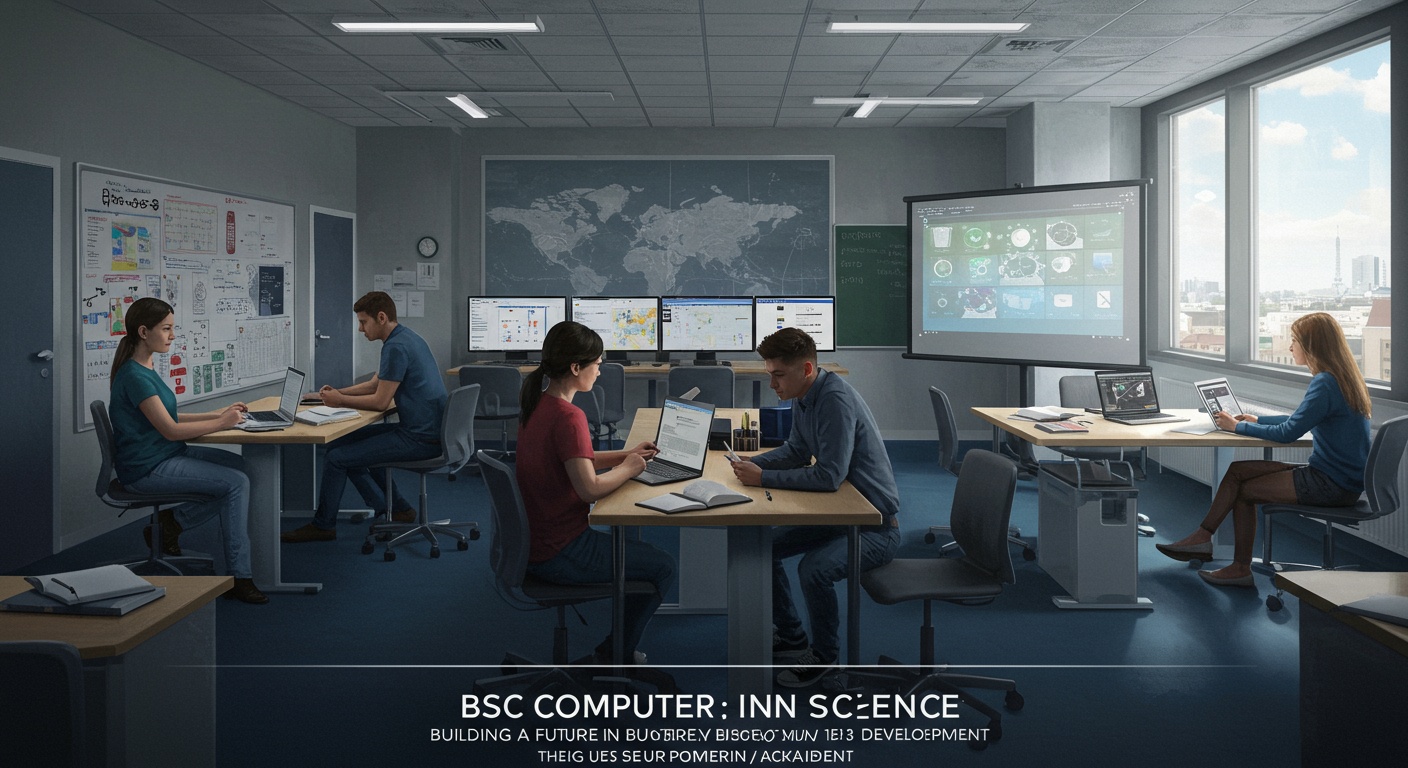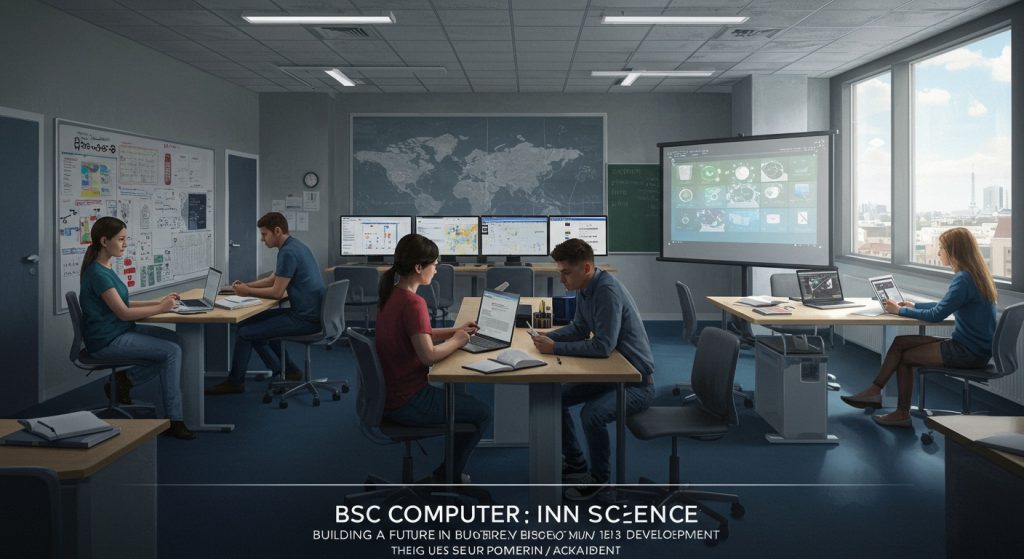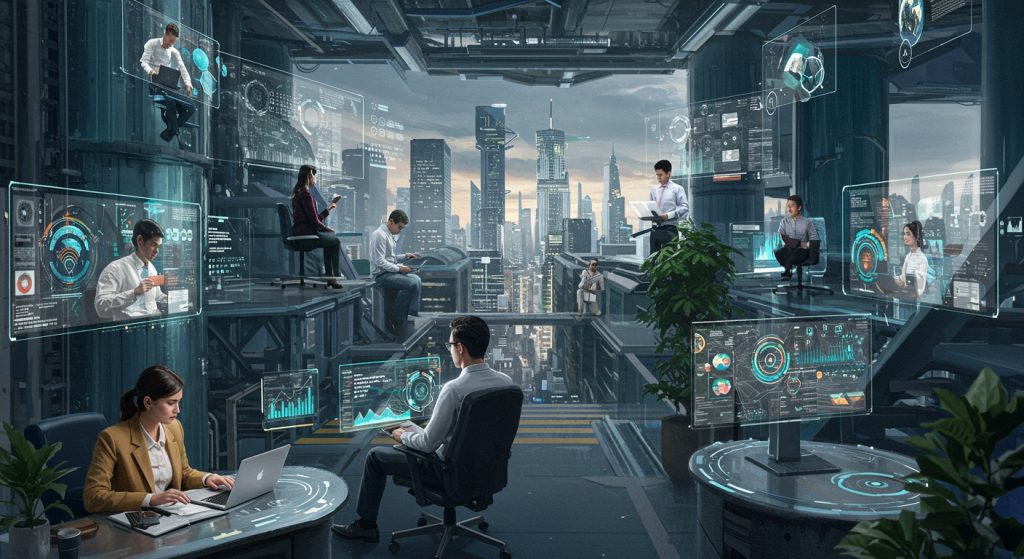Imagine a world where data integrity is paramount. Applications operate with unprecedented transparency. That future is being built now, brick by brick, with blockchain and Web3 technologies. Our BSc Computer Science program empowers you to be at the forefront of this revolution. You’ll master core programming principles alongside specialized skills in decentralized application (dApp) development, smart contract creation using languages like Solidity. Blockchain architecture. Explore the potential of NFTs, DAOs. Decentralized finance (DeFi), while gaining a solid foundation in cryptography and network security. Learn to navigate the challenges of scalability and security audits, preparing you to build robust and innovative solutions for the next generation of the internet.

What is Blockchain Technology?
Blockchain technology, at its core, is a distributed, immutable ledger. Imagine a digital record book that is duplicated across many computers. Every time a new transaction occurs, it’s added as a “block” to the chain. This block is then cryptographically linked to the previous block, creating a secure and transparent history. Because the ledger is distributed, no single entity controls it, making it resistant to censorship and single points of failure.
Key characteristics of blockchain include:
- Decentralization: No central authority controls the network.
- Immutability: Once data is recorded, it cannot be altered or deleted.
- Transparency: All transactions are publicly viewable (though identities can be pseudonymous).
- Security: Cryptographic hashing and consensus mechanisms ensure data integrity.
Popular blockchain platforms include Ethereum, Binance Smart Chain. Solana. Each has its own strengths and weaknesses, influencing the types of applications built upon them.
Understanding Web3: The Decentralized Internet
Web3 represents the next evolution of the internet, aiming to be more decentralized, transparent. User-controlled. Unlike Web2, where large corporations dominate data and services, Web3 leverages blockchain technology to empower individuals and create a more equitable online experience.
Key components of Web3 include:
- Decentralized Applications (dApps): Applications that run on blockchain networks, offering increased transparency and user control.
- Decentralized Finance (DeFi): Financial services built on blockchain, offering alternatives to traditional banking.
- Non-Fungible Tokens (NFTs): Unique digital assets that represent ownership of items, art, or collectibles.
- Decentralized Autonomous Organizations (DAOs): Community-led organizations that operate based on rules encoded in smart contracts.
Web3 utilizes technologies like blockchain, smart contracts. Decentralized storage to create a more user-centric and democratic internet. For instance, instead of relying on a centralized social media platform, users could participate in a decentralized social network where they own their data and control their content. This is a significant paradigm shift and understanding this shift could be beneficial for your career guidance.
Why a BSc in Computer Science is Ideal for Blockchain and Web3 Development
A BSc in Computer Science provides a robust foundation for a career in blockchain and Web3 development. The core skills acquired during the degree are directly applicable to the challenges and opportunities in this rapidly evolving field.
Here’s how:
- Programming Fundamentals: Proficiency in languages like Java, Python. C++ is essential for developing smart contracts and dApps. Solidity, the primary language for Ethereum smart contracts, shares similarities with JavaScript and C++, making it easier to learn for computer science graduates.
- Data Structures and Algorithms: Understanding data structures and algorithms is crucial for optimizing blockchain performance and designing efficient smart contracts.
- Cryptography: Blockchain heavily relies on cryptographic principles. A computer science degree provides a solid understanding of hashing algorithms, encryption. Digital signatures, all essential for blockchain security.
- Networking: Knowledge of networking concepts is vital for understanding how blockchain networks operate and for building decentralized applications that interact with these networks.
- Database Management: While blockchain itself is a type of database, understanding traditional database management systems can be beneficial for integrating blockchain solutions with existing systems.
Moreover, a computer science program often includes courses on software engineering, project management. System design, which are valuable for building and deploying complex blockchain applications.
Key Skills to Develop During Your BSc
While a computer science degree provides a strong foundation, specific skills are particularly valuable for blockchain and Web3 development. Focus on developing these skills during your studies:
- Solidity: The primary language for writing smart contracts on Ethereum.
- JavaScript/TypeScript: Essential for building the front-end and back-end of dApps. Frameworks like React, Angular. Vue. Js are commonly used.
- Web3. Js/Ethers. Js: JavaScript libraries that allow your dApp to interact with the Ethereum blockchain.
- Blockchain Architecture: Understanding different blockchain architectures (e. G. , Ethereum, Binance Smart Chain, Solana) and their consensus mechanisms.
- Smart Contract Security: Learning about common vulnerabilities in smart contracts (e. G. , reentrancy attacks, integer overflow) and how to prevent them.
- Decentralized Storage: Familiarizing yourself with decentralized storage solutions like IPFS (InterPlanetary File System) and Arweave.
- Testing and Debugging: Developing strong testing and debugging skills to ensure the reliability and security of your blockchain applications.
Consider participating in hackathons, contributing to open-source blockchain projects. Taking online courses to further enhance your skills.
Tools and Technologies Every Blockchain and Web3 Developer Should Know
The blockchain and Web3 ecosystem is constantly evolving, so it’s vital to stay up-to-date with the latest tools and technologies. Here’s a list of essential tools and technologies:
- Remix IDE: An online IDE for developing and deploying Solidity smart contracts.
- Truffle/Hardhat: Development frameworks for building, testing. Deploying smart contracts.
- Ganache: A personal blockchain for testing smart contracts locally.
- Metamask: A browser extension that allows users to interact with dApps and manage their cryptocurrency wallets.
- Infura/Alchemy: Infrastructure providers that offer APIs for accessing blockchain data.
- OpenZeppelin: A library of secure and reusable smart contract components.
- Etherscan: A blockchain explorer that allows you to view transactions, smart contracts. Other data on the Ethereum blockchain.
Experimenting with these tools and technologies will give you a practical understanding of the blockchain development process.
Real-World Applications and Use Cases
Blockchain and Web3 technologies are being applied in a wide range of industries, creating exciting opportunities for developers.
- Decentralized Finance (DeFi): Applications like decentralized exchanges (DEXs), lending platforms. Yield farming protocols are revolutionizing the financial industry. For example, Uniswap is a popular DEX that allows users to trade cryptocurrencies without intermediaries.
- Supply Chain Management: Blockchain can be used to track products throughout the supply chain, ensuring transparency and preventing counterfeiting. Companies like Walmart are using blockchain to track the origin and movement of food products.
- Healthcare: Blockchain can be used to securely store and share medical records, improving patient privacy and data interoperability.
- Digital Identity: Blockchain can be used to create self-sovereign identities, giving individuals more control over their personal data.
- Gaming: Blockchain-based games are creating new opportunities for players to earn rewards and own in-game assets. Games like Axie Infinity have popularized the concept of “play-to-earn.”
- NFTs: Non-fungible tokens are being used to represent ownership of digital art, collectibles. Other unique assets. Platforms like OpenSea are facilitating the trading of NFTs.
Understanding these real-world applications can help you identify areas where you can contribute your skills and make a real impact.
Career Paths with a BSc in Computer Science and Blockchain/Web3 Expertise
A BSc in Computer Science combined with blockchain and Web3 expertise opens doors to a variety of exciting career paths.
- Blockchain Developer: Develop and maintain smart contracts and dApps.
- Web3 Developer: Build decentralized applications that interact with blockchain networks.
- Smart Contract Auditor: Review and review smart contracts for security vulnerabilities.
- Blockchain Architect: Design and implement blockchain solutions for businesses.
- DeFi Engineer: Build and maintain decentralized finance applications.
- NFT Developer: Create and manage non-fungible tokens and related platforms.
- Blockchain Consultant: Advise businesses on how to leverage blockchain technology.
The demand for blockchain and Web3 developers is rapidly increasing, making it a promising career path for computer science graduates. Networking and building a strong portfolio are essential for landing your dream job. Look for career guidance programs that can help refine your resume and interviewing skills.
Staying Updated and Continuing Your Learning
The blockchain and Web3 space is constantly evolving, so it’s crucial to stay updated with the latest trends and technologies. Here are some resources for continuous learning:
- Online Courses: Platforms like Coursera, Udemy. EdX offer courses on blockchain development and Web3 technologies.
- Industry Conferences: Attend blockchain and Web3 conferences to learn from experts and network with other developers.
- Online Communities: Join online communities like Reddit’s r/ethereum and Discord servers dedicated to blockchain development.
- Blogs and Newsletters: Follow blogs and newsletters that cover the latest developments in the blockchain and Web3 space.
- Open-Source Projects: Contribute to open-source blockchain projects to gain practical experience and learn from other developers.
By continuously learning and adapting, you can stay ahead of the curve and become a valuable asset in the blockchain and Web3 ecosystem.
Conclusion
Choosing to specialize in Blockchain and Web3 development during your BSc Computer Science degree has equipped you with a powerful toolkit for the future. We’ve explored the core concepts, from cryptography and distributed ledgers to smart contracts and decentralized applications. Now, the real journey begins: the journey of implementation. To maximize your success, prioritize building a strong portfolio. Contribute to open-source Web3 projects, even small ones. This provides invaluable practical experience and demonstrates your skills to potential employers. Don’t just learn the theory; actively experiment with platforms like Ethereum, Solana, or Polygon to comprehend their nuances. A common pitfall is getting bogged down in the theoretical without building real-world applications. I’ve seen many graduates struggle to translate knowledge into tangible results. Remember, success in Web3 isn’t just about technical skills; it’s about understanding the community and its ethos. Engage in online forums, attend conferences. Network with other developers. Your success will be measured not only by the code you write but also by the impact you make in this evolving digital landscape. Keep learning, keep building. Keep pushing the boundaries of what’s possible.
More Articles
Future is Bright: Emerging Job Roles After BSc Computer Science in 2025
BSc Computer Science: Top In-Demand Career Paths of the Future
Future-Proof Your Career: Job Options After BSc Computer Science Degree
BSc Computer Science: Exploring Lucrative Freelance Options for Graduates
FAQs
So, this BSc is about Computer Science. With a focus on blockchain and Web3? What does that actually mean?
Exactly! You’ll get a solid foundation in all the core computer science stuff – programming, data structures, algorithms, the whole shebang. But then, the cool part comes in. We’ll dive deep into the technologies underpinning blockchain (think cryptography, distributed systems). How those are used to build decentralized applications for Web3. It’s like regular Computer Science. With a super-powered specialization.
What kind of jobs could I actually get with this degree?
Oh, the possibilities are pretty wide open! Think blockchain developer, Web3 developer, smart contract auditor, crypto security analyst, decentralized finance (DeFi) engineer, even roles in metaverse development. , anything where computer science meets decentralized technologies. There’s huge demand right now. It’s only going to grow.
Is this degree only for people who already know a ton about crypto and blockchain?
Nope, not at all! We assume you’re coming in with a general interest, not necessarily expertise. The program is designed to take you from the fundamentals of computer science all the way to specialized blockchain and Web3 knowledge. You’ll learn everything you need as you go. Enthusiasm is more essential than prior experience!
What specific programming languages will I learn?
You’ll definitely be working with languages like Python and JavaScript, which are super versatile for general development. But for blockchain specifically, expect to get familiar with Solidity (for smart contracts). Potentially others like Rust or Go, depending on the specific modules. Don’t worry, we’ll teach you them!
Will I get any hands-on experience, or is it all just theory?
Definitely hands-on! Theory is vital. You need to build things to really learn. Expect lots of practical projects, coding assignments. Potentially even opportunities for internships or industry collaborations. We want you to graduate with a portfolio you can show off.
Is this degree really worth it? Is blockchain/Web3 just a fad?
That’s a fair question! While the specific applications of blockchain and Web3 might evolve, the underlying technologies – cryptography, distributed systems, decentralized databases – are incredibly powerful and have broad applications beyond just crypto. This degree gives you a strong foundation in those core concepts, making you adaptable to future technological changes, whatever they may be. Plus, the demand for these skills is currently very high, making it a good investment in your future.
Okay, I’m interested. What are the prerequisites for applying?
Generally, you’ll need a strong background in mathematics and sciences. Specific requirements vary from university to university, so check the program’s website for details. But a solid foundation in those areas will definitely put you in a good position.



